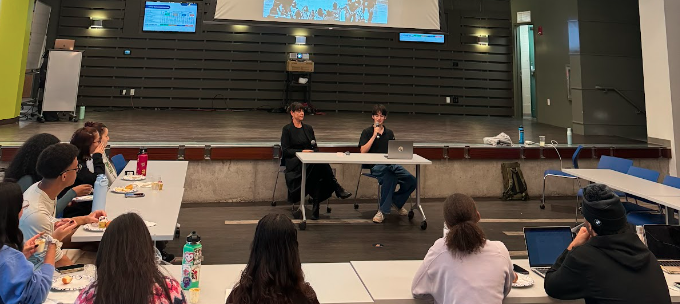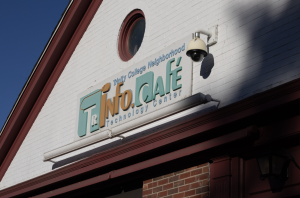Rajsi Rana ’26
News Editor
On Sept. 23, 2024, La Voz Latina (LVL) hosted a Decolonial Dialogues Café Con Leche featuring Professor Macarena Gómez-Barris from Brown University as the speaker. The event was an educational event intended to address contemporary issues in Latin America, and topics discussed included extractivism, racial capitalism, land theft and important activists, artists and writers who think about similar topics in their work.
Professor Gómez-Barris, a Professor and Chair of Modern Culture and Media at Brown University is a “writer and scholar with a focus on the decolonial environmental humanities, authoritarianism and extractivism, queer Latinx epistemes, media environments, racial ecologies, cultural theory and artistic practice,” said Renato Leni Gómez-Barris ‘26, when introducing her. Professor Gómez-Barris began the event by saying, “It’s [LVL] a small community but it has a big impact… to gather from so many different places and so many different subject positions and so many diasporas. I think it’s really important to think of yourselves as really incredible children of the empire and [the] future generation of the Americas. Thank you for inviting me.”
She then went on to discuss extractivism and racial capitalism. Extractivism is the exploitation of natural resources for an economic reward. That definition includes the political and economic dependency on resource extraction. Professor Gómez-Barris defined the extractive zone as “the regions that colonial capitalism carves out and ransacks in relation to non-renewable natural resources, particularly within dense and heterogenous pools. It also references military violence, cultural appropriation and representational forms of extraction from indigenous bodies, and territories of land and water defense.” She then went on to discuss capitalism as a political economic system that takes from the earth and turns its resources into money and commodities. She discussed racial capitalism by describing how colonial powers created pyramidal hierarchies of people, and eventually reorganized and conquered spaces. Racial capitalism is the idea that racialized exploitation and capital accumulation are mutually constitutive.
Professor Gómez-Barris dove deeply into the topic of extractivism, discussing a few case studies of the concept. First, she brought up petroleum industry in Eastern Ecuador. The government initiatives to increase the share of crude oil in the country has prominent environmental implications, including deforestation, water contamination, and displacement of indigenous communities, which are often disproportionately affected by extractive policies. She discussed the long-term ecological damage, pointing out how resource dependence threatens biodiversity and contributes to climate change. She also brought up the spiritual tourism industry in the sacred valley of Peru, which enables tourists to experience the spiritual aspects of the Incan past, commodifying the indigenous spirituality. This exploits indigenous communities and risks erasing the authentic meanings behind their spiritual practices. Professor Gómez-Barris linked these case studies to bigger problems of “living in the aftermath of colonialism,” and illustrated how extractivism continues to perpetuate inequalities and environmental degradation across Latin America.
Another big concept Professor Gómez-Barris discussed during the event was the continuity of land theft, particularly on indigenous water bodies and rivers. She discussed the example of what is now called the Magdalena River In Colombia, but was originally called the Yuma River. “Columbia was the first place to grant rivers rights, and gave the river a voice.” This river was renamed by the Spanish during their colonization, and by renaming the river they impacted the land’s cultural significance. She discussed the term anthropocene, which is when human activities are substantially altering parts of the earth, during this segment of the event. She emphasized that by renaming the Yuma River, colonization and extractivism are ongoing practices that continue to reshape landscapes and displace indigenous communities.
The event concluded with a question and answer segment. One of the questions pertained to the petroleum industry in Venezuela, and the economy boom, nationalization, extractivism of oil there. Professor Gómez-Barris answered by discussing the tension between ecologist and historical attempts to gain sovereignty over resource extraction to combat colonialism. Another question was about the connection between capitalism and climate change destruction, which she answered by discussing the transversality, the impact across different groups and spaces, that has.
Two of LVL’s E-board members, Renato Leni Gómez-Barris ‘26, LVL’s Mac Liaison and Radel Taveras ‘27, LVL’s Co- Community Service Chair, shared a few reflections of the event in an interview with the Tripod. Gómez-Barris discussed the reflections that the event would hopefully have on LVL’s organization as a whole. “I hope that people’s perception of LVL changed a bit to a more professional and academic organization. The point at the end of the day is to make a more inclusive space, a more intersectional and international space.” This event discussed a topic that is largely related to the events and experiences of Latin American people outside of the United States diasporic Latin American. Gómez-Barris said, “In the US, most people are focused on issues that affect the Latino Diaspora in the US. This event created a branch with a more international perspective.” Taveras emphasized the importance of the event, saying that, “This conversation was very constructive, like an initiation into a realm of conversations about how we can think through lenses of decolonial theory and how we can see things from a different perspective. It was an enlightening conversation.”
The event closed off with a big round of applause for Professor Macarena Gómez-Barris, who closed off the event by thanking LVL for inviting her.






+ There are no comments
Add yours